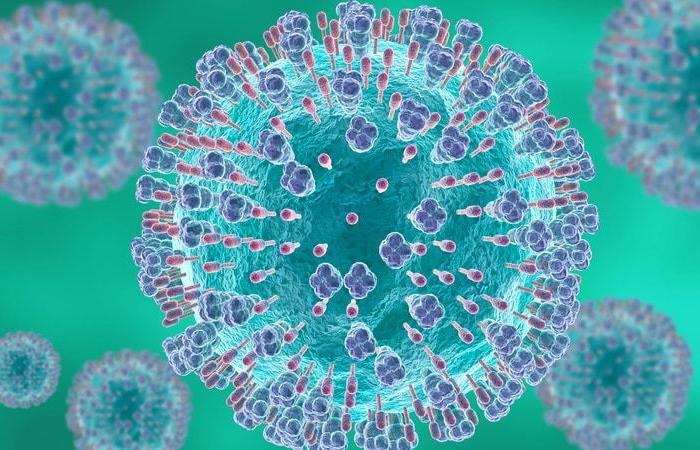UNITED STATES– According to a new cross-sectional American study, one in five hospitalized patients infected with respiratory syncytial virus (RSV) develops an acute cardiovascular event. In the case of pre-existing cardiovascular disease, this even concerns one in three patients, according to results published in the JAMA Internal Medicine[1].
RSV is well known to affect the respiratory tract, particularly the mucous membranes of the upper tract as well as the ciliated epithelium of the trachea and bronchi. And this is not the first respiratory virus known to have potentially devastating consequences for the cardiovascular system: “During the Covid-19 pandemic, we observed a significantly higher mortality rate in patients with a pre-existing cardiovascular disease, and that the causes of deaths linked to Covid were essentially of a cardiovascular nature”, recalls the Pr Stephan Balduswho heads Clinic III for Internal Medicine at the Heart Center of the University Hospital Cologne.
“A direct link between the influenza virus and the occurrence of acute coronary events has also been proven,” he adds. “Various studies have shown that during the first few days of a flu infection, rates of heart attacks and, therefore, death increase significantly. This new study shows that RSV infection significantly increases the risk of acute cardiovascular events in patients with cardiovascular disease. »
If there are no official recommendations for this vaccination yet [contre le VRS]it is already recommended by two associations of oncologists and pulmonologists.
Rebecca C. Woodruff
An analysis of RSV surveillance data in the United States
The Dre Rebecca C. Woodruff (Division of Heart Disease and Stroke Prevention at the National Center for Chronic Disease Prevention and Health Promotion in Chamblee, USA) and colleagues analyzed data from an RSV surveillance program, involving hospitals in 12 US states. The data concerned adults aged at least 50 years and hospitalized, over 5 seasons of RSV infection (from 2014/2015 to 2017/2018, and 2022/2023).
The 6248 patients in this database had been hospitalized for various reasons. They were 73 years old on average, and 60% of them were women. RSV infection was detected by a doctor-ordered test within 14 days of admission. A little more than half (56.4%) of the patients had pre-existing cardiovascular disease, which was not always the cause of hospitalization.
Researchers report that just over a fifth (22.4%) of RSV-infected patients experienced an acute cardiovascular event. Acute heart failure was the most common (15.8%), but the analysis also showed:
– acute ischemic heart disease in 7.5% of patients,
– a hypertensive crisis in 1.3% of others,
– ventricular tachycardia in 1.1%,
– and cardiogenic shock in 0.6%.
Acute events even in some patients without pre-existing CV disease
8.5% of patients had no documented pre-existing cardiovascular disease. However, the risk was particularly high among the remainder, 33.0% of whom experienced an acute cardiovascular event as part of their RSV infection. And these patients had a severe course almost twice as often as those who had not suffered an acute cardiovascular event. The authors of the study defined the severity of the severe course as the need for intensive care and/or invasive mechanical ventilation, or death in hospital.
Among all patients hospitalized with RSV, 18.6% required intensive care treatment and 4.9% died during hospitalization. Those who experienced an acute cardiovascular event had a significantly higher risk of admission to the intensive care unit (25.8% versus 16.5%) and death in hospital (8.1% versus 4.0% ).
This study was not prospective and controlled but, for Stephan Baldus, its results strongly suggest that RSV has an impact on the cardiovascular level. “The fact that one in five hospitalized patients develops a cardiovascular event strongly suggests this. »
Should we test more often for RSV?
The study results strengthen the level of evidence for an association between RSV infection and significantly increased morbidity and mortality in older adults. However, unlike what is observed for Covid and the flu, this type of infection is little monitored. Its screening is rarely carried out, even in a hospital setting. “The reason many doctors choose not to test is because they are unaware of the importance of RSV as a pathogen in adults, and also because the diagnosis of RSV infection VRS does not have therapeutic consequences,” explain Rebecca Woodruff and her colleagues.
As there is no targeted treatment for RSV yet, its detection can only serve as a marker of an increased risk of acute cardiovascular events, according to Stephan Baldus, who also believes that it is not necessary to detect the presence of the virus in all patients with cardiovascular disease. The determining element is the clinical presentation: “The test would be desirable when there are clinical signs of pulmonary restriction, such as dyspnea, tachypnea, a subfebrile state or an alteration in general condition. This particularly applies to patients requiring intensive care or respiratory support. »
RSV vaccination could be a game changer
Rebecca Woodruff and her team further point out that while their results “illustrate the epidemiology of potential cardiovascular complications of RSV infections, this was before RSV vaccination was available.” »
It was in 2023 that the first RSV vaccine for adults aged 60 or older was approved. “It opens the door to additional options,” says Stephan Baldus. In Germany for example, “although there are no official recommendations for this vaccination yet, it is already recommended by two associations of oncologists and pulmonologists. Given the importance of cardiovascular disease for prognosis as well as for determining the risk of acute cardiovascular events if RSV is detected, it is expected that a suitable recommendation will eventually be published. »
Nadine Eckert declares no financial ties to the subject of this article. The possible financial ties of Dr. Rebecca Woodrufff and her collaborators are described in the original article. Dr. Stephan Baldus has received lecture honoraria from GSK.
This article is a translation-adaptation by Dr Claude Leroy of the article written by Nadine Eckert published by Medscape.com and entitled As with COVID-19: RSV infection increases the risk of acute cardiovascular events in hospital – should all patients be tested?






